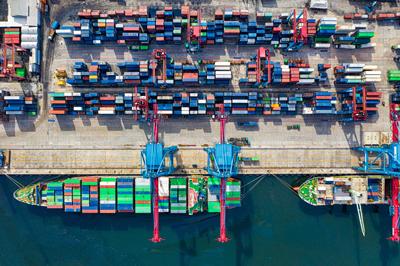
In October 2018, Dr Jenny Zhang (Law, IML, SMMI) and I were invited to provide oral evidence to the House of Lords European Union Select Committee, EU Internal Market sub-committee, as part of the sub-committee’s Inquiry on Future EU-UK Transport Arrangements.
Often such an invitation would follow provision of written evidence to the Inquiry, but in this case neither of us had submitted written evidence. In 2017, however, the Southampton Marine and Maritime Institute (SMMI), led by members of the Institute of Maritime Law (IML), including Jenny, had produced a written report "The UK maritime sectors beyond Brexit". This report had come to the attention of the Clerk of the Committee in the context of this Inquiry, and led to the invitation to SMMI to provide expert evidence relating to the maritime transport sector.
In advance of the hearing we were advised that we would appear as one panel, with no other witnesses in our part of the session. To assist in our preparation for the hearing, the Clerk of the Committee sent us some indicative questions, with the caveat that these might not be asked, or that additional questions could be asked. Jenny and I have quite different expertise, but between us we cover the international, public, regulatory and specifically EU substantive legal aspects (myself), and UK domestic, private and commercial maritime law aspects (Jenny) of issues arising in respect of the impact of Brexit upon the maritime transport sector, so we were able to divide the questions up both for preparation and to address in the session.
Neither of us had appeared before a select committee before, and while preparing we were grateful for support from Gareth Giles @public policy, and also from Prof. Will Jennings and Prof. Rachel Mills, both of whom were willing to share their experience of appearing before a select committee. A key suggestion from Will was to think about what we wanted to get from the session. This makes sense: while the Chair of the Committee might have a clear idea of what they think is important in advance of a hearing, and identify questions accordingly, expertise may well provide a different understanding of priorities or issues, and it is crucial to bring this into consideration. For me, for example, this included communicating the complexity of the Maritime Transport industry: while it is a distinct sector in itself, it is essentially comprised of service provision. Its smooth operation, particularly at current volumes is predicated upon smooth market access, which itself is reliant upon regulatory convergence and equivalence (if not harmonisation). Related, it is necessary to recognise that while no deal Brexit would mean that EU law ceases to apply as such to the UK, other international law, including WTO Law and IMO Regulation will continue to apply, and will have a significant impact upon both the operation of trade generally and maritime transport.
Appearing as an ‘expert witness’ in the surroundings of the Houses of Parliament, can be a daunting prospect. The opportunity to share your knowledge and your understanding with those involved in the development of policy is, however, an opportunity to be grasped with both hands. In such a context, if we capture the audience’s attention, we can have an impact on policy. In June 2016, Michael Gove famously asserted that ‘people in this country have had enough of experts’, our experience in the House of Lords select committee indicates that this is far from being universally the case. It is our job as researchers, as experts, to seize every opportunity to prove him wrong, and make it count. The Report of the Inquiry, Brexit: road, rail and maritime transport, published in May 2019, which substantively references both Jenny’s and my evidence in the maritime chapter, suggests that when we do, it can make a difference.
The recording and transcript of the evidence session is available at www.parliament.uk. The report is available here.
By:
Professor Emily Reid
Professor of International Economic Law and Sustainable Development